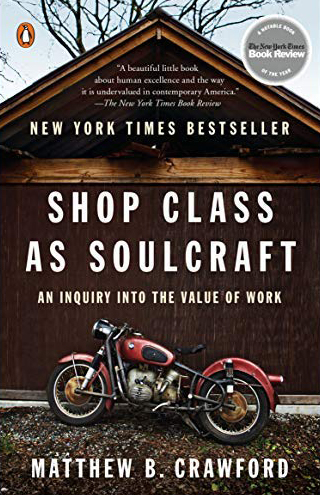I began to read Eloge du Carburateur – Essai sur le sens et la valeur du travail (translated from the American essay Shop Class as Soulcraft: An Inquiry into the Value of Work) by Matthew B. Crawford. I wrote a first post about why I began that book here.
Here is an interesting critique of artificial intelligence and the meaning of work (read on page 205 of the French edition & found on Google books)
“In John Searle’s famous critique of artificial intelligence, he asks us to imagine a man locked in a room, with only a slit connecting him to the outside world [1]. Through the door come pieces of paper with Chinese writing on them. The man does not know Chinese. Unbeknownst to him, the writing takes the form of questions. He is equipped with a set of instructions in English, for matching other Chinese symbols to the ones he is given. He passes these back through the slit, and they are taken to be answers to the questions. Searle’s point is that to perform the task, the man needn’t know any Chinese, and neither does a computer that does the same task as he. Some enthusiasts of artificial intelligence, insist that the system knows Chinese – somehow there is thinking without a thinker. But a less mystical position would leave it as a saying that it is the human programmer, who wrote up the instructions for matching Chinese answers to Chinses questions, who knows Chinese.
“The mechanic relying con computerized diagnostics finds himself in a position similar to that of the man in the Chinese room. The crucial stipulation in the thought experiment is that one could indeed have a set of rules that is fully adequate for matching answers to questions without any reference to the meaning of the words being trafficked in . Whether this is in fact possible is a deep question in linguistics and philosophy of midn, and there is no noncontroversial answer to it. Yet the thoughtless way in which work is often conceived seems to presume the stipulation is correct. We view human beings as inferior versions of computers.”
[1] John R. Searle, “Minds, Brains and Programs”, Behavioral and Brain Science, 3, n.3, September 1980.
I had noticed in my French post other interesting points:
“We are used to thinking of intellectual virtue and moral virtue as two very different things, but in my opinion this distinction is erroneous. The mutual involvement of ethics and knowledge is well understood by Robert Pirsig in what remains to my mind one of the most successful (and funniest) passages of his Zen and the Art of Motorcycle Maintenance [More on wikipedia here]. (…) To be a good mechanic, it is necessary to know how to engage personally: I am a mechanic. On the other hand being a good mechanic means having a keen awareness of the fact that your task has nothing to do with the idiosyncrasies of your personality, that it has something universal. (…) The identification of this truth requires a certain disposition of the individual, a certain capacity of attention accompanied by a feeling of responsibility towards the motorcycle.” [Pages 113-115]
“Virtue is the effort to cross the veil of egocentric consciousness and to find the world as it really is. This effort is never completely successful because our own concerns constantly interfere with it. But getting out of oneself is the task of the artist, and also that of the mechanic.” [Page 117]
“So what advice should be given to young people? If you feel a natural inclination for university research, if you urgently need to read the hardest books and think you can spend four years doing it, then sign up for college. In fact, approach your university studies in a spirit of craftsmanship, immersing yourself in the world of humanities or natural sciences. But if it’s not the case, if the prospect of spending four more years sitting in a classroom gives you headaches, I have good news for you: nothing forces you to simulate the slightest interest in the student life for the simple purpose of making a decent living as an output. And if you still want to go to college, learn to do something during the holidays. You’ll have a better chance of feeling better about yourself, and possibly getting better paid, if you’re pursuing a freelance craftsman career than locked up in an open-space office (a “modular workstation” as they say elegantly ), to manipulate fragments of information or to play low quality “creatives”. Certainly, to follow this advice, perhaps it is necessary to possess a little rebellious personality, because this assumes to reject the path traced for a professional future conceived as obligatory and inevitable.” [Page 65]
“One of the principles of contemporary management is to abandon the management of details to the base and accumulate recognition of merit at the top. For leaders, the rule is to avoid making real decisions that may end up hurting their career but knowing how to cook a posteriori stories that allow them to interpret the least positive result in their favor.” [Page 61]

